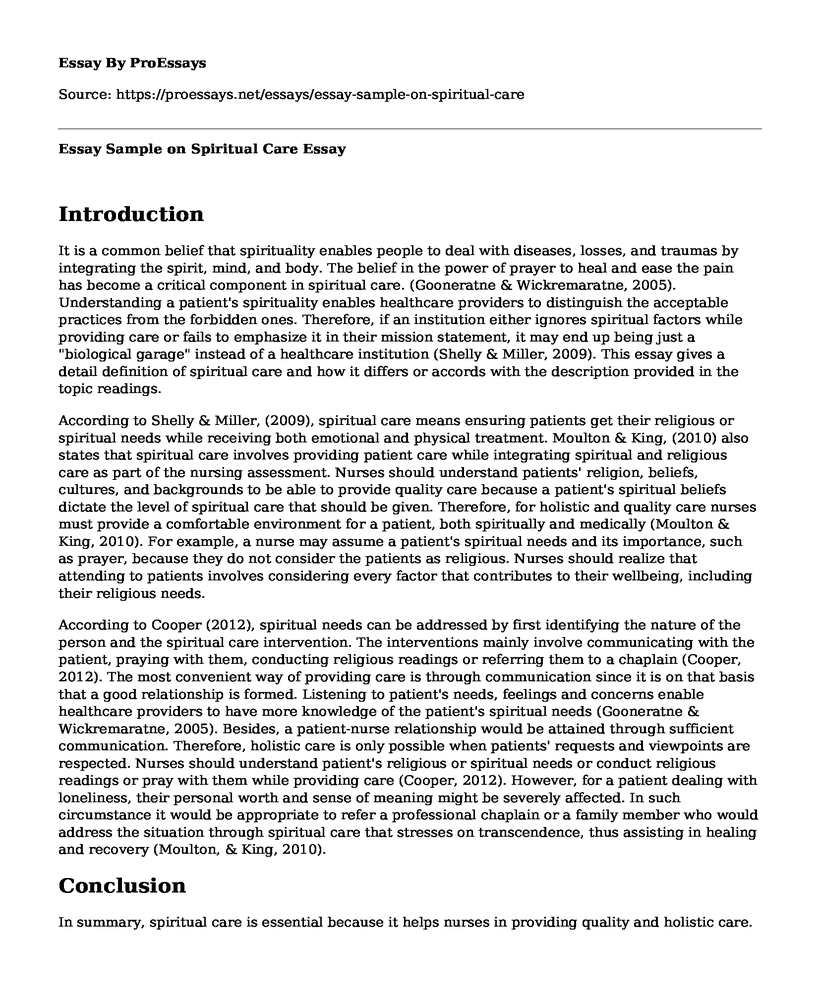Introduction
It is a common belief that spirituality enables people to deal with diseases, losses, and traumas by integrating the spirit, mind, and body. The belief in the power of prayer to heal and ease the pain has become a critical component in spiritual care. (Gooneratne & Wickremaratne, 2005). Understanding a patient's spirituality enables healthcare providers to distinguish the acceptable practices from the forbidden ones. Therefore, if an institution either ignores spiritual factors while providing care or fails to emphasize it in their mission statement, it may end up being just a "biological garage" instead of a healthcare institution (Shelly & Miller, 2009). This essay gives a detail definition of spiritual care and how it differs or accords with the description provided in the topic readings.
According to Shelly & Miller, (2009), spiritual care means ensuring patients get their religious or spiritual needs while receiving both emotional and physical treatment. Moulton & King, (2010) also states that spiritual care involves providing patient care while integrating spiritual and religious care as part of the nursing assessment. Nurses should understand patients' religion, beliefs, cultures, and backgrounds to be able to provide quality care because a patient's spiritual beliefs dictate the level of spiritual care that should be given. Therefore, for holistic and quality care nurses must provide a comfortable environment for a patient, both spiritually and medically (Moulton & King, 2010). For example, a nurse may assume a patient's spiritual needs and its importance, such as prayer, because they do not consider the patients as religious. Nurses should realize that attending to patients involves considering every factor that contributes to their wellbeing, including their religious needs.
According to Cooper (2012), spiritual needs can be addressed by first identifying the nature of the person and the spiritual care intervention. The interventions mainly involve communicating with the patient, praying with them, conducting religious readings or referring them to a chaplain (Cooper, 2012). The most convenient way of providing care is through communication since it is on that basis that a good relationship is formed. Listening to patient's needs, feelings and concerns enable healthcare providers to have more knowledge of the patient's spiritual needs (Gooneratne & Wickremaratne, 2005). Besides, a patient-nurse relationship would be attained through sufficient communication. Therefore, holistic care is only possible when patients' requests and viewpoints are respected. Nurses should understand patient's religious or spiritual needs or conduct religious readings or pray with them while providing care (Cooper, 2012). However, for a patient dealing with loneliness, their personal worth and sense of meaning might be severely affected. In such circumstance it would be appropriate to refer a professional chaplain or a family member who would address the situation through spiritual care that stresses on transcendence, thus assisting in healing and recovery (Moulton, & King, 2010).
Conclusion
In summary, spiritual care is essential because it helps nurses in providing quality and holistic care. According to Cooper, (2012) spiritual care also gives hope to the patients when they begin questioning the worth of life; in cases of chronic illnesses, it provides comfort and compassion. In instances where nurses are unable to provide spiritual care such as praying with the patient, a professional chaplain may be called to help patients focus on the value of life and its transcendent meaning. Thus, nurses should consider a patient's spiritual needs inclusively when providing care.
References
Cooper, R. J. (2012). Making a case for ethical decision-making models. Nurse Prescribing, 10(12), 607-611.
Gooneratne, S., & Wickremaratne, A. (2005). End of Life and Sanctity of Life. Virtual Mentor, 7(5).
Moulton, B., & King, J. S. (2010). Aligning Ethics with Medical DecisionMaking: The Quest for Informed Patient Choice. The Journal of Law, Medicine & Ethics, 38(1), 85-97.
Shelly, J. A., & Miller, A. B. (2009). Called to Care: A Christian Worldview for Nursing. Westmont: InterVarsity Press.
Cite this page
Essay Sample on Spiritual Care. (2022, Apr 20). Retrieved from https://proessays.net/essays/essay-sample-on-spiritual-care
If you are the original author of this essay and no longer wish to have it published on the ProEssays website, please click below to request its removal:
- Principles and Assumptions of the Humanistic Approach to Counselling Essay
- Essay Example on Is Buddhism Pessimistic?
- A Change in Mental Health Policy - Paper Example
- Out of This Furnace: the US Economy in the Period Between 1880 to 1920 Essay
- Empathic Confrontation in Counseling Paper Example
- Personality: Nature vs Nurture: The Debate Over Development - Research Paper
- Joyce Patricia Brown: From Lecturer to Street Living and Struggling With Mental Illness - Essay Sample







